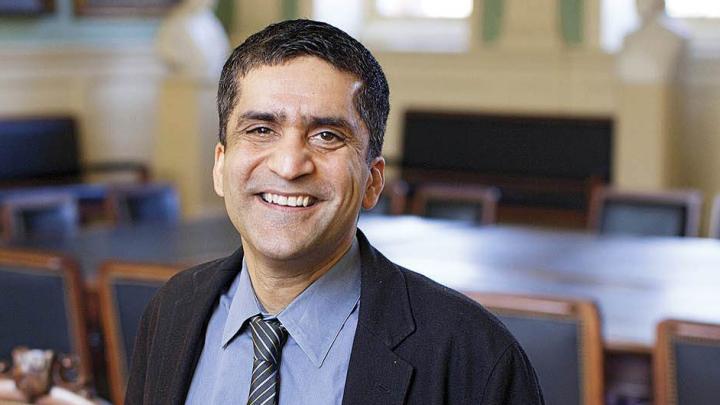Rakesh Khurana, Bower professor of leadership development at Harvard Business School and professor of sociology in the Faculty of Arts and Sciences (FAS), will become dean of Harvard College on July 1. He and his wife, Stephanie Ralston Khurana, have served as master and co-master of Cabot House since mid 2010, and will retain those posts when Khurana assumes his new duties in University Hall. FAS dean Michael D. Smith announced the appointment on January 22. It follows a formal search, and concludes a somewhat difficult decanal transition from Evelynn M. Hammonds, who departed at the end of the 2012-2013 academic year, to Donald Pfister, who serves as interim dean this year.
As a House master, Khurana is already deeply involved with undergraduates’ daily lives outside the classroom, an important aspect of the College dean’s responsibilities. In inclination and intellect (he studies leadership development, organizational behavior and effectiveness, and management as a profession), he is known for building consensus, listening and creating opportunities for others to be heard, and enthusiastic engagement with the students in Cabot House. (See our online report for more on Khurana’s background and Harvard commitments.)
In his statement, Dean Smith said Khurana “brings to the deanship an intimate understanding of the Harvard College experience, a profound commitment to the values of a liberal-arts education, and a warm and compassionate personality that accompanies his belief in the importance of community and an inclusive approach to decision-making.” The new dean, he continued, “will advance undergraduate education with both a respect for enduring values and the ability to embrace change. He understands the interplay of academic, extracurricular, and residential life at Harvard….”
Speaking by telephone from Davos, where he was participating in the World Economic Forum, Khurana said that he and his wife insisted on remaining at Cabot House, citing their enjoyment of the responsibility and its importance in informing their sense of student needs as he shapes College policy. Asked about FAS’s prospective academic honor code for undergraduates (Khurana serves on the committee leading this work), he broadened the conversation this way: “There is a strong thirst among students, faculty, and staff to discuss these issues and create space for these discussions to happen. That is a really important part of the College education. It goes back to the roots of the liberal arts,” as students shape their “moral identities” and determine “the people they hope to become.” That work goes on not only in the classroom but also in the Houses, he said. “It’s hard to have those conversations without considering the whole person,” and he expressed hope that the opportunities for such exchanges and reflections could be strengthened—part of his desire, as College dean, to “work in ways that create a transformative experience for our students.”








